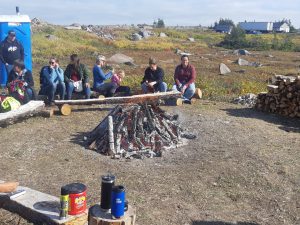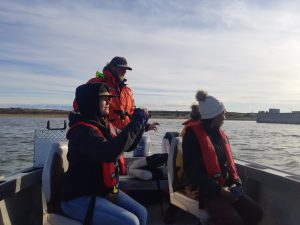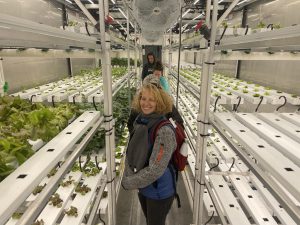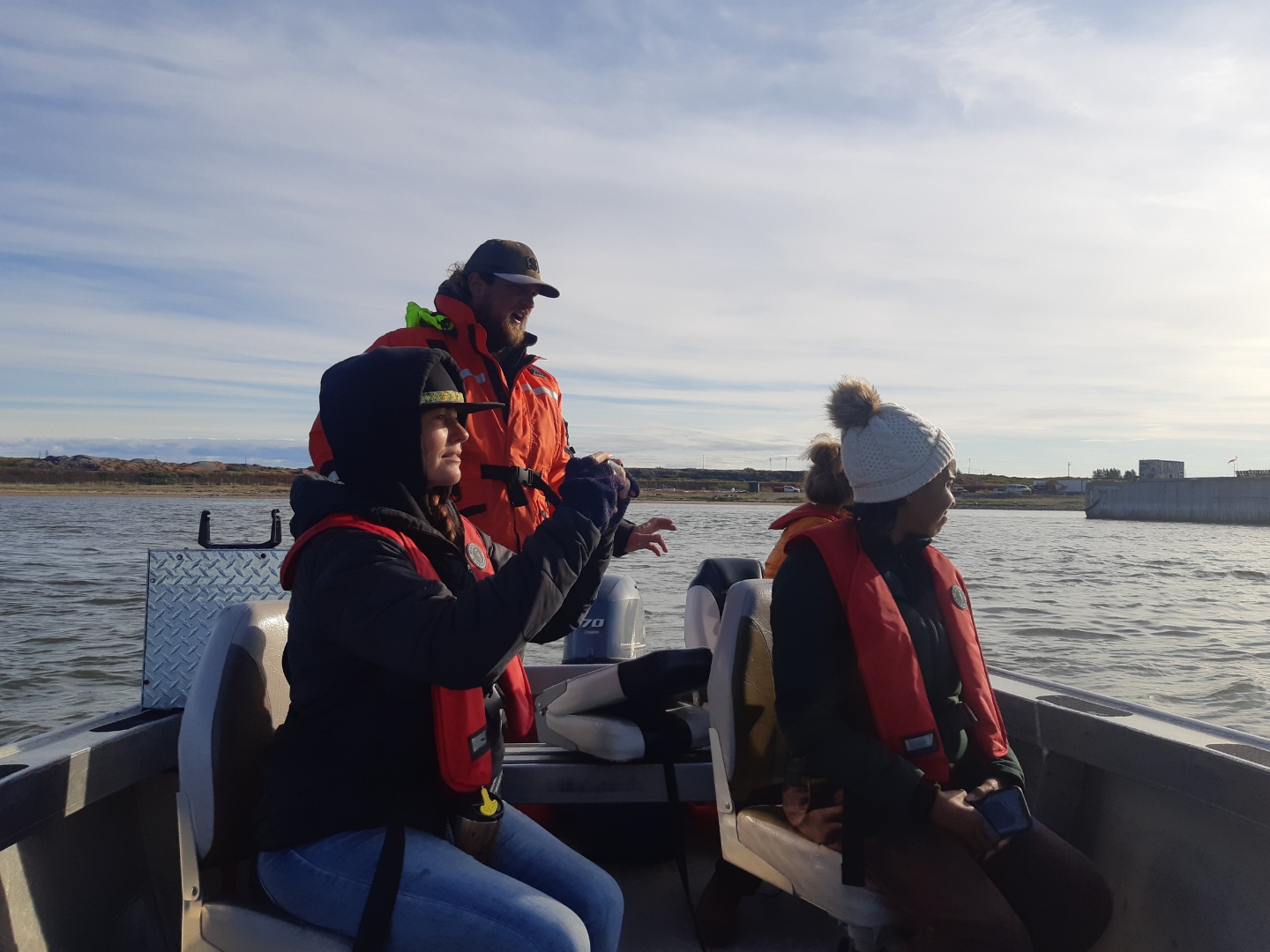By Chanel Best, Program Specialist (National Programming)
Facilitating cross-regional learning is a central goal of MakeWay’s National program team. The sharing of knowledge between individuals and across geographies fosters our ability to grow allowing us to work better together today than we did yesterday.
 I recently participated in two community learning trips that brought together members of funding collaboratives to share knowledge and reflect upon collaborative models.
I recently participated in two community learning trips that brought together members of funding collaboratives to share knowledge and reflect upon collaborative models.
This year I was invited to visit two communities where I felt and overwhelmed with gratitude. I know these experiences will forever remain an integral part of my lifelong learning journey.
In July, I was invited to Red Rock Indian Band, Ontario by Gaagagige Zaagibigaa. Later in September, I was invited by the Northern Manitoba Food Culture and Community Collective (NMFCCC) to spend time in Churchill, Manitoba. What could these places over 1200 km apart have in common? These trips offered more than delicious food, shared stories, and beluga whale sightings; they are part of a story of collective growth.
Coming Home
When I arrived on the traditional land of the Anishinabewaki ᐊᓂᔑᓈᐯᐗᑭ peoples in Thunder Bay, Ontario I drove an hour northeast of the house I grew up in to attend the first annual Maamigin ‘gathering’ held by Gaagagige Zaagibigaa. They are an Indigenous-led project hosted on MakeWay’s shared platform who are working to improve Indigenous food sovereignty across communities in northern Ontario. Gaagige Zaagibigaa translates to “forever cultivating”, and in Anishnaabemowin of Maamigin means to “gather.”
The spirit and smells of Maamigin were warm, friendly, and brought me a sense of familiarity; Red Rock Indian Band is located on the shores of Lake Superior, I consider this my homelands as my maternal grandmother’s ancestors have resided on this watershed for the past seven generations. The event allowed me to view the lands I grew up on through a new lens. The knowledge exchange camps included hide tanning, smoke hut building and smoking, traditional medicines, and meat butchering. I spent the first day listening to cultural land-based teachings and learning how to help prepare moose hides, and the second eating smoked sturgeon, manoomin (wild rice) and moose stew.
As the gift of this gathering was extended to family, I chose to share this experience with my mother who still resides in Thunder Bay. She, like myself is naturally inclined to strike up a conversation with anyone and expressed with sentiment that the conversations she shared over the course of the weekend were “life-changing.” The learning at these events presented a crucial moment to unlearn in real time as well. For me, sharing this experience firsthand alongside 150 other guests from across Turtle Island felt magical.
Gathering Again in Churchill
 Arriving to a new place for the first time can feel just as special as visiting home. There was opportunity to connect with community members, Elders and colleagues in a meaningful way at both gatherings. When I arrived in Churchill for the second gathering, I felt joy to see some familiar faces that I met in Red Rock in July.
Arriving to a new place for the first time can feel just as special as visiting home. There was opportunity to connect with community members, Elders and colleagues in a meaningful way at both gatherings. When I arrived in Churchill for the second gathering, I felt joy to see some familiar faces that I met in Red Rock in July.
The journey to Churchill, Manitoba – a community of less than 1,000 people – was long. The town isn’t accessible by road, access in and out requires a two-hour flight from Winnipeg or a 48-hour train ride. When we arrived, we were graciously welcomed for the seventh annual learning trip hosted by the NMFCCC at the Churchill Northern Studies Centre. The centre is home to Rocket Greens, an all-season insulated nursery that provides 250-400 pieces of fresh food weekly to the residents of the town. The other local initiative that the NMFCCC collaborates with is Churchill’s Warrior Caregiver’s program, the time we spent with them was especially meaningful as they organized a sweat lodge ceremony on the last afternoon.
The lands of the Anishinaabeg, Cree, OjiCree, Dakota, and Dene Peoples, and the homeland of the Michif Piyii (Métis) Nation, or what is today known as Churchill Manitoba, are breathtakingly beautiful and profoundly unique. Three ecosystems converge on the shores of Hudson Bay and the mouth of the Churchill River, the sub-artic, boreal forest and marine biomes coexist making it an expert site for scientific research.
To prepare for the trip we were instructed to read the book Night Spirits by Ila Bussidor and Üstün Bilgen Reinart. This story is about the forced relocation of the Sayisi Dene of Northern Manitoba and was my first interaction with this important and tragic moment in Canada’s history. Reading the novel beforehand enabled me to connect in a deeper way with the lands I was privileged to be on, and the stories shared with me during that week.
 The beginning and end of the week were bookended by beautiful ceremony with lots of laughing, inward reflection, and contemplation in between. Spirit is everywhere, and there were many moments and new friends that grounded me spiritually throughout the week. The trip also gifted me the opportunity to spend time with like-minded individuals involved in similar ways with the desire to learn. The week was full of invigorating discussions about collaborative models, the importance of deep trust-based relationships and how working in these ways inherently brings value to community.
The beginning and end of the week were bookended by beautiful ceremony with lots of laughing, inward reflection, and contemplation in between. Spirit is everywhere, and there were many moments and new friends that grounded me spiritually throughout the week. The trip also gifted me the opportunity to spend time with like-minded individuals involved in similar ways with the desire to learn. The week was full of invigorating discussions about collaborative models, the importance of deep trust-based relationships and how working in these ways inherently brings value to community.
On my visits to Red Rock and Churchill I witnessed the immense growth that can occur by connecting in person. Exploring successes and troubleshooting challenges together is an essential form of cross regional learning that encourages appreciation between collaboratives and communites. It is my responsibility to pass along the knowledge gained from these experiences and share what I learned with others to continue fostering growth.
